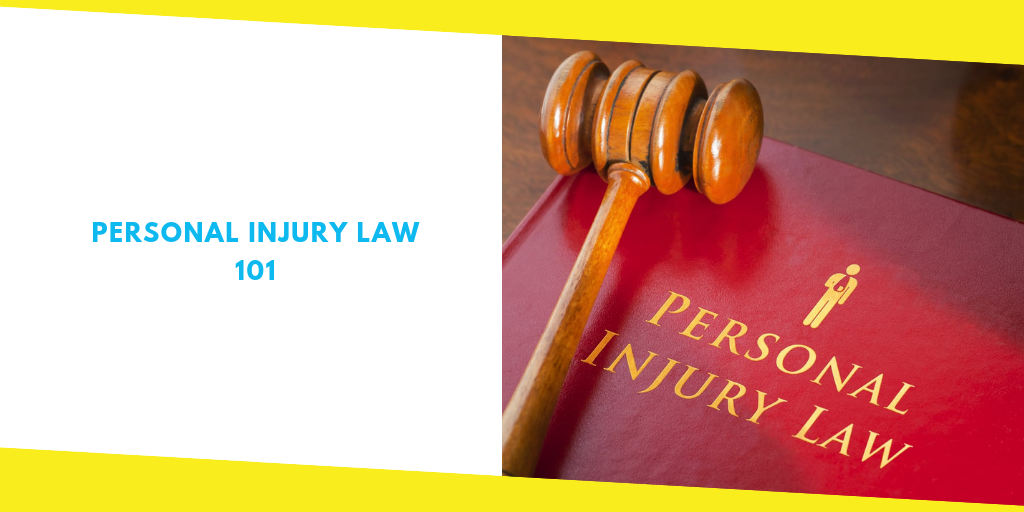Personal Injury Law 101: What You Need to Know
This post was last updated on September 13th, 2019

The word “tort” comes from the Latin term for twist, harm, or wrong – and that’s exactly what tort law covers: any situation in which you have been wronged or harm according to legal definitions. As you can imagine, there are many, many different specialties under the umbrella of tort, or personal injury, law. This quick primer is intended to teach you the fundamental things you need to know if you have suffered a personal injury, or if a loved one has been a victim of wrongful death.
Contents
ToggleThe Doctrine of Negligence
As the old saying goes, accidents happen. Being injured simply because your car skidded off the road into a tree does not form the foundation of a personal injury claim. If, however, your car’s brakes failed, or there was a large oil spill on the road that caused your car to slide, or another driver T-boned your car and caused the crash, then you might be able to bring a lawsuit against the person or entity responsible for the accident.
Negligence simply means that someone, or some entity such as a manufacturer, agency, company, or organization, had a duty of care to you, and that they failed in discharging that duty. Negligence occurs when irresponsible behavior puts another person or people at risk.
Intentional Torts
Negligence isn’t the only cause of action that can result in a personal injury claim, however. Strict liability laws hold a defendant responsible even if negligence is not present and the defendant took every possible precaution. Strict liability generally concerns situations and activities that are inherently dangerous, no matter how much care is taken to prevent injury or harm. The demolition of a building is one example when strict liability might come into play, as is the transportation of hazardous materials.
Defective Products
Defective products and product liability are another common tort. The fundamental supposition behind product liability is that the manufacturer made and sold an unsafe product, and therefore should be held responsible. Class action lawsuits often concern defective products. If you’ve ever received a settlement amount because you bought and consumed a particular packaged food, for example, and the courts later determined that the labeling on that food was misleading, then you’ve been a plaintiff in a defective product lawsuit.
Intentional Torts
Lastly, intentional torts are instances in which a person or entity intentionally tries to harm another. Theft, assault and battery, trespassing, and false imprisonment are examples of intentional torts.
Common Types of Personal Injury Law
Attorneys who make their living representing plaintiffs in personal injury cases generally specialize in a particular area of personal injury law. Some of the most common include:
- Slip and fall
- Medical malpractice
- Wrongful death
- Motor vehicle accidents
- Animal bites
- Asbestos and mesothelioma
- Nursing home abuse
- Construction Injuries
- Slander, defamation, and libel
Of course, this list is only a smattering of personal injury law subcategories. No matter what type of accident or injury has befallen you, there are attorneys out there who have experience with similar cases.
Damages in a Tort Claim
The purpose of bringing a lawsuit against a negligent party is to make the plaintiff “whole” again. Naturally, it is impossible to restore a person’s health or life, or restore their slandered reputation, or to make them “un-abused.” So in most cases, the attorney for the plaintiff will seek monetary compensation.
In addition to compensating someone for the value of any personal property or real estate that has been damaged, most tort claims also seek compensation for “pain and suffering” caused by the negligent act. Punitive damages may also be leveled against the defendant, if the court deems it appropriate.
Loss of earnings, either for a period of time that has already passed or a period of time in the future, during which the plaintiff will not be able to work, are also common in personal injury settlements. According to Schwartzapfel Lawyers, another type of compensation is called “loss of consortium,” and refers to the emotional loss suffered by a person whose spouse has been killed. There is also loss of parental consortium, which pays out to minor children who have lost a parent due to negligence.
Settlement and Trial
The vast majority of tort disputes never go to trial, but are settled out of court through negotiation. At its heart, the process of settling a personal injury claim is simple: the defendant will offer a compensation amount, the plaintiff will reject it, and the defendant offers a new amount. This continues until a satisfactory amount of damages is reached, or until one of the interested parties decides that negotiation and settlement will not be sufficient to solve the matter, and declares their intention to go to trial.
Of course, there are many other determining factors that must be taken into account. The sheer complexity of personal injury law means that individuals who have suffered an injury under the law require the services of an attorney. Unlike filing for divorce or entering into a landlord-tenant relationship, for example, personal injury law is not something you can DIY.
Have You Been Injured Due to Negligence?
If you’ve sustained injuries because of another party’s negligence, contact personal injury attorneys in your area to schedule complimentary consultations. You won’t have to pay any fees up front, as most attorneys in this area of law work on contingency – and they just may be able to help make you whole again by getting you the compensation you deserve.
Misdiagnosis can have extreme implications for an individual’s health, which can result in a myriad of unnecessary treatments or even fatality. So, many patients and family members might consider pursuing litigation for misdiagnosis to receive compensation for damages that might have been caused by a medical practitioner.
Recommended For You
Car Accident: What to Do and What Not to Do
Most Inside
Most Inside offers high-quality recommendations and valuable updates to enhance all aspects of your life, providing premium guidance and enriching experiences.




